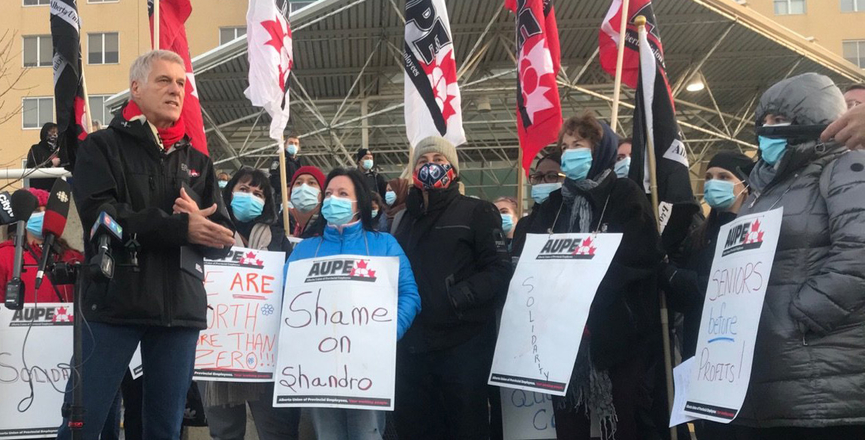The Alberta Labour Relations Board (ALRB) has ruled that the Alberta Union of Provincial Employees broke the law when some of its healthcare members took part in a short illegal strike in the fall of 2020. Yesterday, the board ordered Alberta Health Services to stop collecting union dues, assessments and other fees payable to the union for one month.
The dues suspension, a shorter version of the six-month suspension sought by AHS, could cost AUPE about $1.6 million according to a union estimate quoted in the board decision, which was made public yesterday.
If the suspension ever takes place, that is. The AUPE is certain to appeal the labour board’s decision to the courts.
Labour relations experts warn that if the suspension is implemented, the labour board’s decision may be costly to the union, but it will actually make “wildcat” strikes by members more likely, not less, since it financially rewards participants in illegal strikes.
The illegal strike
Front-line AUPE healthcare workers across the province walked off the job on the morning of October 26 2020. They went back to work the next day.
The walkout began at the Royal Alexandra Hospital in Edmonton and soon spread to the Foothills Medical Centre in Calgary, the University of Alberta Hospital in Edmonton, and other locations including Cold Lake, St. Paul, Wetaskiwin and Leduc.
There are about 25,000 workers in AUPE’s health care general support services bargaining unit, and approximately 16,000 in its so-called auxiliary nursing care unit, according to the 47-page ALRB decision. By no means did all of them take part in the wildcat walkouts, however.
Anger had been building among healthcare workers, and not just members of AUPE. As COVID-19 arrived in Alberta, the Kenney Government was pushing forward with its plan to lay off more than 11,000 healthcare workers at AHS.
Earlier that month, then-health minister Tyler Shandro had vowed to eliminate almost 10,000 jobs by outsourcing laundry services, food preparation, and community medical labs.
“Those involved in this illegal action will be held accountable,” then-finance minister Travis Toews insisted at the time of the walkout, reflecting the government’s confrontational attitude.
The AHS has claimed the strike resulted in 249 surgeries being cancelled.
The decision
While AUPE argued there was no evidence it had planned the strike, the three-member board panel concluded that “there was nothing before the board to suggest the union took steps to discourage illegal strike activity prior to the strike commencing,” in the ruling released on Wednesday. “Nor is there evidence to suggest that, once the strike was underway, the union encouraged its members to return to their regularly scheduled shifts, or even encouraged some to stay behind to provide a measure of essential services,” it reads.
In a passage of unusually colourful writing for a labour board decision, the tribunal went on to say that the “AUPE knew the pot was starting to simmer. Not only did it not take any meaningful steps to turn down the heat, but once things boiled over and a strike was underway, it continued to stir the pot. In these circumstances, seeking to avoid a dues suspension by arguing that its members ultimately cooked this up is inconsistent with both the evidence and the purpose of the provision.”
The provision it refers to is section 71 of the Alberta Labour Relations Code, which says that “no employees, no bargaining agent and no person acting on their behalf shall strike or cause a strike or threaten to strike or to cause a strike unless that strike is permitted by this Act.
Accordingly, the board concluded, it was directing AHS “to suspend the deduction and remittance of union dues, assessments and other fees payable to AUPE by employees in the GSS and ANC units for a period of one month.”
It added that “the parties can discuss the timing of the implementation of this order.”
More wildcat strikes to follow
The problem with the board’s approach, said Athabasca University Labour Studies Professor Dr. Bob Barnetson yesterday, is that “workers know wildcats work.”
Unlike formal strikes, “there are no rules and the employer has no time to prepare,” Barnetson explained. “Workers aren’t going to give up that kind of leverage.”
“A $1.6-million dues suspension will not dampen workers’ appetite for future wildcats, which are triggered by intolerable employer behaviour,” he added. “Perversely, the labour board just gave every wildcatter a small monetary reward for wildcatting in the form of dues they don’t have to pay!”
United Nurses of Alberta Labour Relations Director David Harrigan agreed.
What is the average non-culinary expert worker to take from the board’s pot-boiling metaphor?
Harringan answered, “that the LRB will not hesitate to award union dues cessation. But such a punishment is markedly different from a fine that the union must pay.”
Instead of the union paying money to the state, he explained, rank-and-file members save money on union dues. In this case, a small percentage of members walked off for half a day, and all members of the bargaining unit saw a more than one per cent increase in their take-home pay for the month as a result.
“Union members will no doubt be calculating cost/benefit analyses of various conduct for future rounds of bargaining,” Harrigan concluded.
Moreover, Barnetson added, “unions are unlikely to act against wildcatting members. Explicitly sanctioning AUPE for supporting wildcatting members will likely just encourage ‘please return to work, wink-wink’ communications in the future to attenuate any penalties.”
The real culprit here is the UCP government, Barnetson asserted. They “sought to lay off healthcare workers and turned collective bargaining into a hollow and fettered process with its secret mandates,” he said.
“If Danielle Smith goes back to this well,’ Barnetson warned, “I expect we’ll see more wildcats and continued shortages of healthcare workers.”
AUPE has not yet published a response to the board’s decision.



